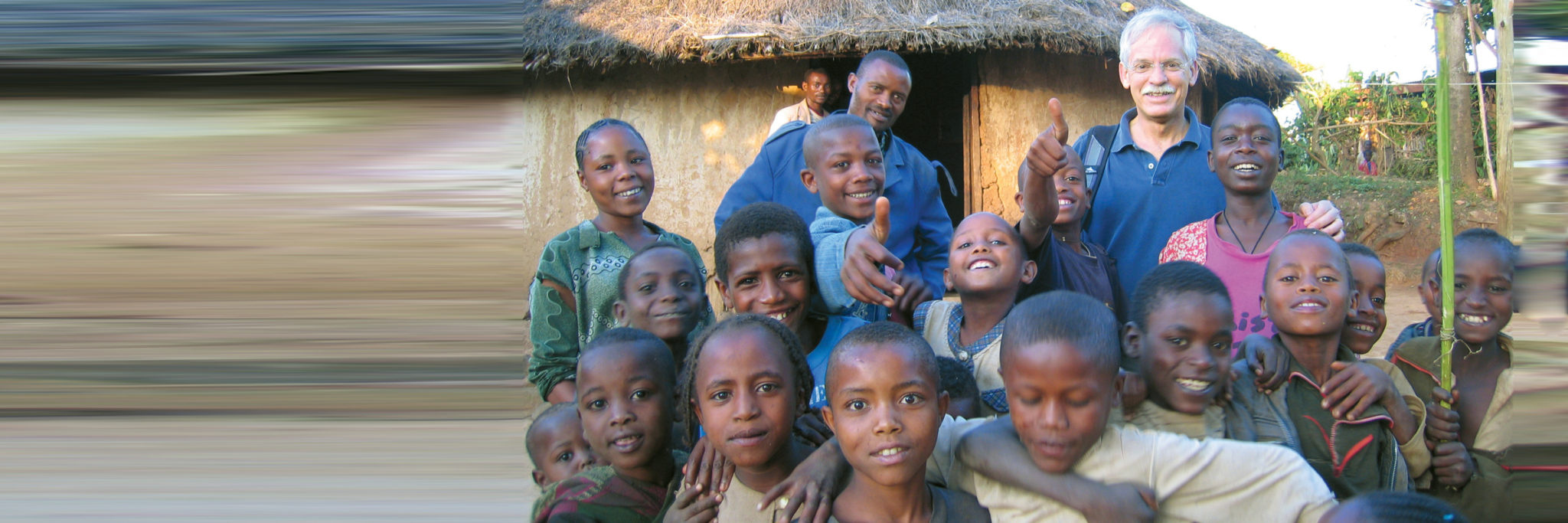Americans consume more java than any other country in the world, paying from $4 to $11 a pound for coffee. Meanwhile, farmers in developing nations who grow the product often earn as little as 80 cents a pound—or less. Fair trade organizations around the world are trying to narrow that gap, working with wholesalers to secure fair fee structures that result in more money for farmers. It’s a subject Rick Peyser ’72 has followed closely over the years, from his perch as director of social advocacy and coffee community outreach for Green Mountain Coffee Roasters, one of the country’s largest coffee companies.
Peyser first learned about fair trade nearly 20 years ago, following a visit from an organization called Coffee Kids, a nonprofit group that promotes awareness about poverty among third-world coffee farmers. “They really put a face on coffee for me,” says Peyser, who at the time worked in Green Mountain’s direct mail department.
Over the next decade, he traveled to several coffee-growing countries in Latin America and Africa, meeting farmers and learning more about fair trade movement, which advocates fair wages for farmers, artists, and other workers in predominantly developing nations whose goods are marketed and sold around the world. Peyser shared what he learned with Green Mountain executives, who eventually created the department Peyser now heads and became one of the first coffee companies to adopt fair trade practices. Today, about 30 percent of the company’s products are fair trade certified.
Annual fair trade sales on all products worldwide total around $400 million, which accounts for just .01 percent of the $3.6 trillion in global sales of various goods according to the nonprofit Fairtrade Foundation, one of several organizations that promote fair trade and review companies’ policies to determine if their products should be fair trade certified. To earn this classification, a company must return one-third to one-fourth of the profits on goods to the producers. As a result, coffee growers who sell to fair trade organizations earn a minimum of $1.31 per pound.
While an improvement over previous earnings, the profits still leave many farmers on the edges of poverty. So some third-world governments are looking for ways to increase farmers’ income. Peyser’s latest efforts in the fair trade arena involve working with government officials in Ethiopia—the birthplace of coffee.
Ethiopia wants to trademark the names of three geographic regions that produce some of the most highly sought-after coffee beans—Harar, Sidamo, and Yirgacheffe. Coffee companies often sell their products under the name of the region in which the beans were harvested. If Ethiopia’s trademarking efforts are successful, the country could license the names to those companies, securing a higher price for the country’s farmers.
The move raised eyebrows in several coffee houses across the U.S., including Starbucks, which initially object-ed to Ethiopia’s trademark attempts. The coffee giant soon found itself targeted by workers’ rights organizations around the world, which kicked off an international public relations disaster. In June, Starbucks signed an agreement with Ethiopia’s intellectual property office acknowledging the country’s ownership of the three names, regardless of whether they’re trademarked.
While this drama unfolded, Peyser worked behind the scenes to negotiate a letter of intent between Green Mountain and Ethiopia that outlines how the company and country will work together to bring farmers better value for their coffee. “We recognize that there is a link between the quality of coffee we receive from a community and the quality of life in that community,” says Peyser, who now serves as president of the board for Coffee Kids. Peyser also is a board member for the Fair Trade Labeling Organization International, which sets the international standards for fair trade that benefit more than 1 million small farmers around the world.
Though many other nations have honored Ethiopia’s requests, the U.S. Patent and Trademark Office has never before trademarked geographic names. Rather, it has granted them certification marks that carry no licensing rights. But as this issue was going to press, U.S. officials had trademarked the Yirgacheffe name; applications for Hirar and Sidamo were still pending.
Green Mountain’s role in all of this, beyond the letter of intent signed with Ethiopia, is stature. By collaborating with a large coffee company, Ethiopian officials hope that other companies will join them at the negotiating table. “It’s not so much about our ability to purchase Ethiopian coffee in vast quantities,” Peyser says. “It’s to help them develop a program to promote their products and generate more sales and income—whether the marks are recognized by the patent office or not.
“Meanwhile, many coffee-producing countries are watch-ing Ethiopia to see what happens,” he adds. “Depending on the outcome [of the trademark decisions], other countries may follow their lead.”

